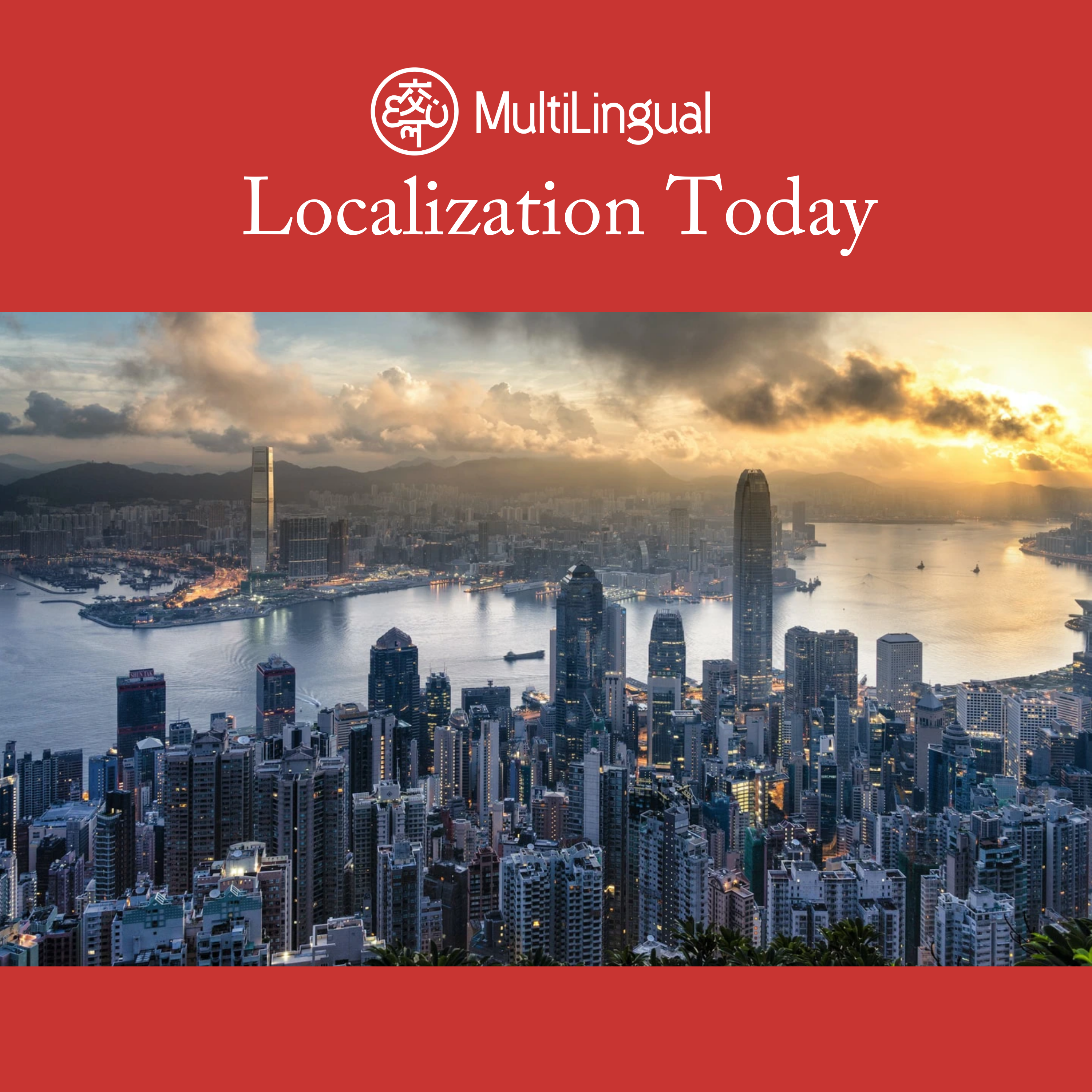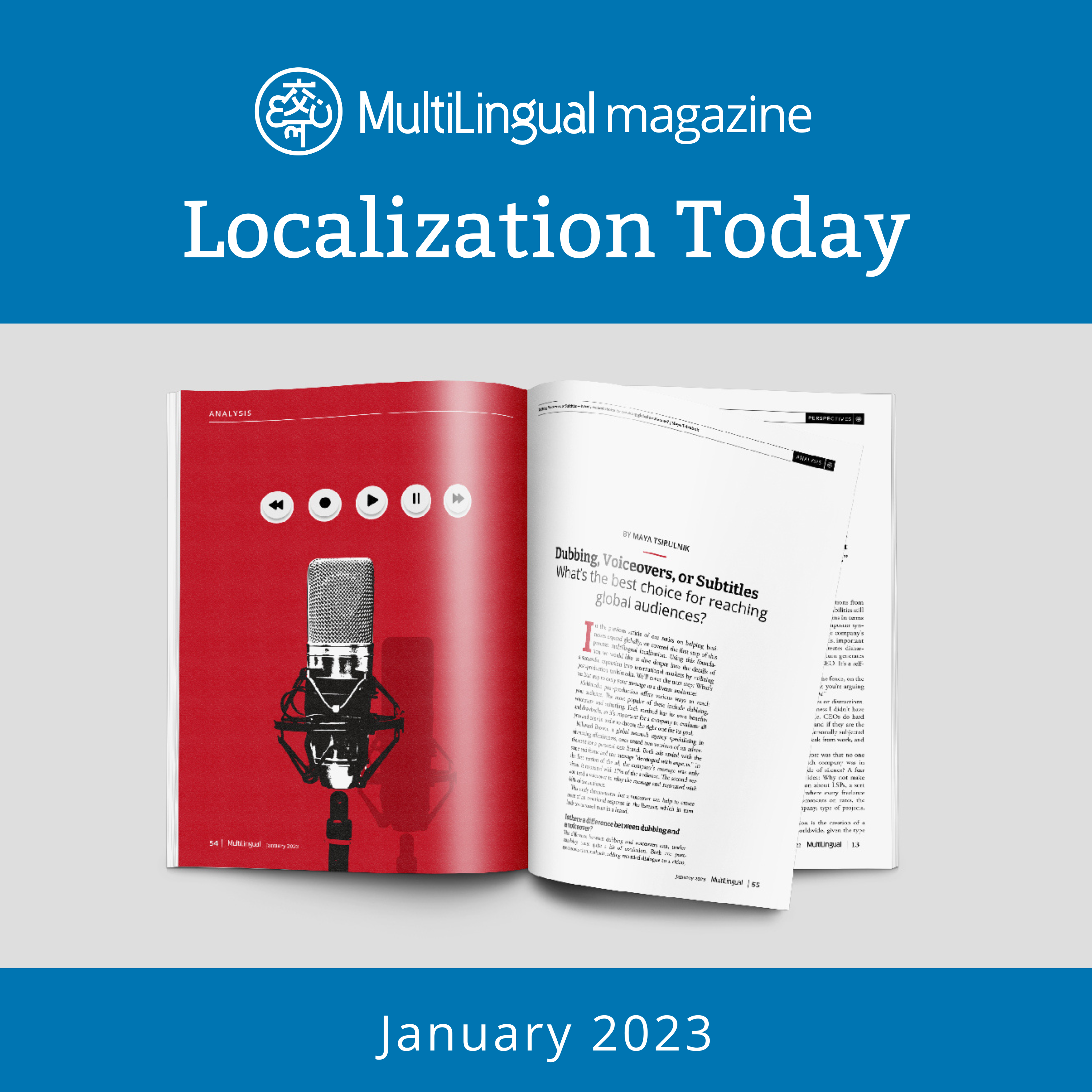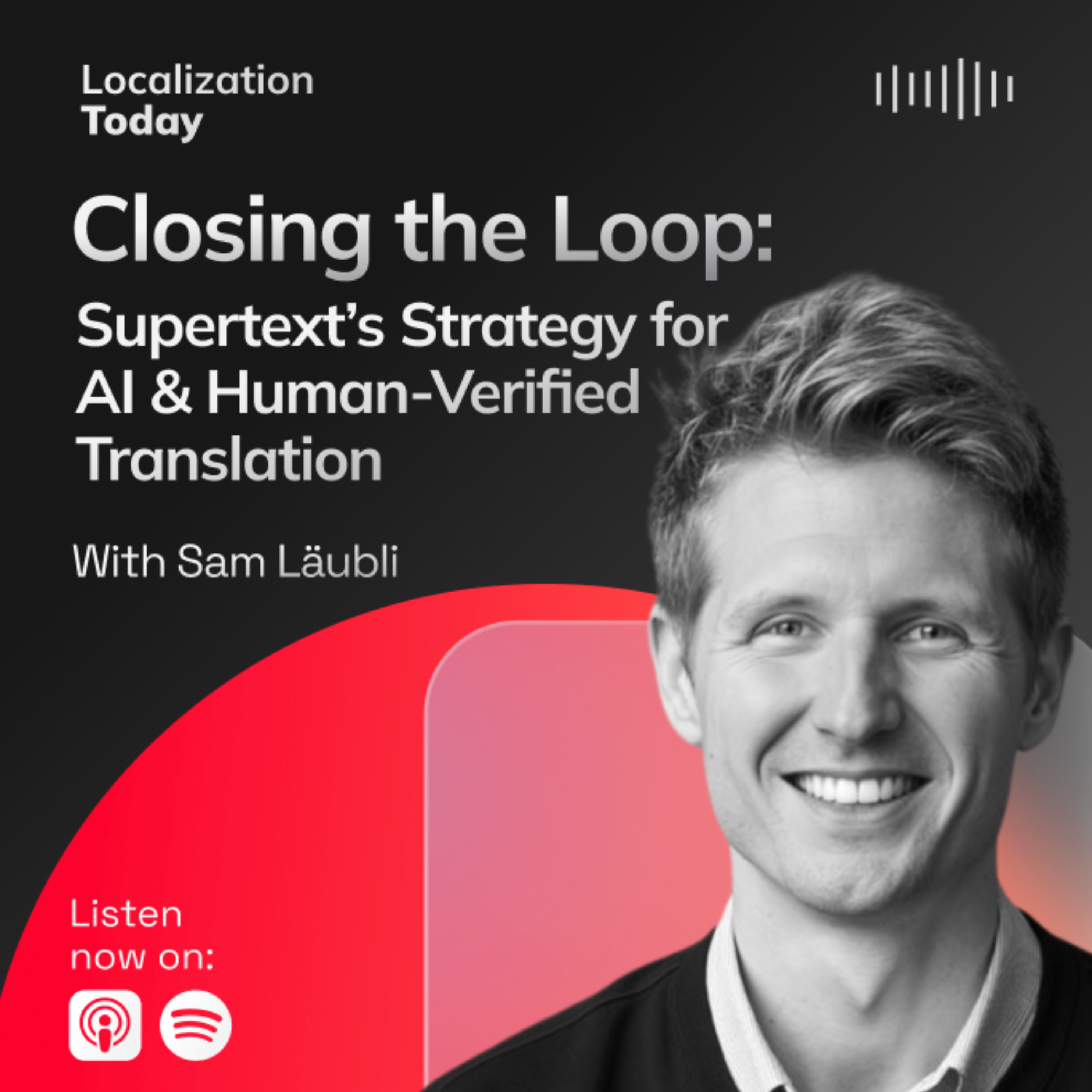Episode Transcript
[00:00:06] Speaker A: This is localization Today, a podcast from multilingual media covering the most relevant daily news in the language industry.
[00:00:15] Speaker B: Building the african language industry one project.
[00:00:19] Speaker C: At a time by you see Alan G. Cedric Christian in this article, I.
[00:00:26] Speaker D: Reflect on my experiences advocating for african.
[00:00:29] Speaker E: Languages and developing Africas burgeoning language industry.
[00:00:33] Speaker B: Through collaboration and continuous learning, I believe.
[00:00:36] Speaker E: We can foster innovation and sustained impact on the continent.
[00:00:40] Speaker B: Leveraging machine translation, MT, and other technologies.
[00:00:44] Speaker E: Can accelerate this progress.
[00:00:46] Speaker B: Together, we can strengthen african language service.
[00:00:49] Speaker E: Providers and increase the visibility and accessibility of african languages.
[00:00:55] Speaker F: One step at a time early years of learning and convictions growing up in.
[00:01:01] Speaker B: Cameroon, I was a quiet and gentle child.
[00:01:04] Speaker C: A bit timid.
[00:01:05] Speaker B: I found joy, comfort, and peace in the pages of books. I voraciously read two or three books weekly.
[00:01:12] Speaker E: Sometimes I would secretly read in class.
[00:01:15] Speaker B: When the teacher had his back turned.
[00:01:17] Speaker E: While I was not a football fan like my classmates, my childhood years werent.
[00:01:21] Speaker B: Boring as I discovered the world through.
[00:01:24] Speaker F: Books as a teenager.
[00:01:26] Speaker E: It didnt matter to me whether I was reading in English or French. I was more interested in the stories.
[00:01:32] Speaker B: Than in the languages they were written in. It was during my university years when.
[00:01:36] Speaker E: Studying translation and comparative literature, that I.
[00:01:40] Speaker D: Understood the epistemological and cultural value of.
[00:01:42] Speaker F: Writing, publishing, and reading in ones own language.
[00:01:46] Speaker E: I started advocating for multilingualism through the.
[00:01:49] Speaker B: Bilingual Club for National Unity, where I.
[00:01:53] Speaker D: Organized several programs to foster intercultural communication.
[00:01:57] Speaker E: Between anglophones and francophones in Cameroon.
[00:02:00] Speaker B: Later, I added teaching and research as.
[00:02:03] Speaker D: Advocacy instruments for the rehabilitation and valorization.
[00:02:06] Speaker E: Of african languages and cultures. These formative years strengthened my convictions regarding.
[00:02:12] Speaker D: The need to elevate african languages, not.
[00:02:14] Speaker F: Only at the policy level but also.
[00:02:17] Speaker B: In practice by ensuring that they are.
[00:02:19] Speaker E: Widely taught and used in both private and public spaces. I grew tired of seeing our national.
[00:02:25] Speaker B: Languages primarily spoken in families but not.
[00:02:28] Speaker E: In public workspaces and international platforms. Not one to simply lament the status.
[00:02:33] Speaker C: Quo, I decided to take action.
[00:02:36] Speaker F: Establishing professional communities in 2022, I established.
[00:02:42] Speaker E: Kabad Group to provide translation and interpretation services in african languages. While many lsps focus on the business.
[00:02:49] Speaker D: Aspect of marketing and selling their services.
[00:02:52] Speaker E: We chose to dedicate 85% of our.
[00:02:55] Speaker D: Resources and time towards building the industry.
[00:02:57] Speaker B: By creating solutions to the problems we observed.
[00:03:01] Speaker E: The first problem was the absence of.
[00:03:03] Speaker B: A specialized community of practice for language professionals in Africa.
[00:03:08] Speaker E: While there were national translation and interpreters associations, I couldn't find a continental umbrella where language professionals could connect and collaborate.
[00:03:17] Speaker F: So I decided to create one, focusing.
[00:03:19] Speaker E: On not only translators but also teachers of african languages.
[00:03:24] Speaker B: This is how the LinkedIn group known as the african language translators and teachers was established. Today, about 1600 members are using it.
[00:03:34] Speaker E: To exchange ideas, share events, and find opportunities.
[00:03:38] Speaker F: Later on, we realized the need for.
[00:03:41] Speaker E: A closer relationship with language professionals. We established the marketplace of african translators.
[00:03:47] Speaker B: And intaprettas Mahdi, where lsps can easily access freelancers using WhatsApp accelerates exchanges and business deals, and dozens of freelancers are being recruited on a daily basis thanks to Mahdi.
[00:04:01] Speaker C: While Alat and Maati were growing, there.
[00:04:04] Speaker E: Was a need for a more institutional.
[00:04:05] Speaker D: Platform with greater legitimacy and advocacy power to really trigger significant changes in the industry.
[00:04:12] Speaker E: This idea was fed by Renato Beninado.
[00:04:15] Speaker B: Co founder of Nimzi Insights, who shared.
[00:04:18] Speaker D: His experience with translation associations.
[00:04:21] Speaker B: He inspired me and ad Kulibali, operations manager of Bolingo Consult, to advance with the idea. Fast forward to Urgus 2023 and the association of Language Companies in Africa was.
[00:04:36] Speaker C: Born with Kabad group myself, boling go.
[00:04:39] Speaker B: Consult ad Koulibaly, Ken translators Alfred Ntawali.
[00:04:44] Speaker F: And Folio online Johann Batha as co founders.
[00:04:48] Speaker B: This was a dream come true as.
[00:04:51] Speaker D: I see Alka as a powerful mobilization.
[00:04:53] Speaker E: And advocacy instrument to promote professionalism, learning.
[00:04:56] Speaker B: And growth in Africas language industry. Working in isolation limits impact, but collaboration.
[00:05:02] Speaker D: Always unlocks unlimited possibilities.
[00:05:05] Speaker E: Our official launch during the fourth Africa.
[00:05:08] Speaker B: International Translation conference in Kigali, Rwanda, increased.
[00:05:13] Speaker D: Awareness of ALCA and the many benefits.
[00:05:15] Speaker E: It offers to members.
[00:05:17] Speaker B: It resulted in increased membership registration and.
[00:05:20] Speaker E: We are now planning the first annual.
[00:05:22] Speaker D: Conference of LSPs in Africa in August.
[00:05:24] Speaker F: 2024 in Accra, Ghana.
[00:05:27] Speaker E: It will be a unique opportunity to.
[00:05:29] Speaker B: Engage major lsps on the continent.
[00:05:32] Speaker E: Please reach out if interested in being.
[00:05:33] Speaker F: A partner, sponsor, or advertiser advocating for african languages.
[00:05:40] Speaker C: Once Alat, Mahdi, and Alco were established.
[00:05:43] Speaker B: It was now time for me to.
[00:05:44] Speaker E: Focus more on research and advocacy. My goals were to generate more evidence about the economic value of african languages.
[00:05:52] Speaker B: To articulate the state of and dynamics in the african LSP market, and to.
[00:05:56] Speaker E: Increase public awareness and engagement with policymakers and business leaders.
These goals led me to join Ad Koulibaly and Avishta sires in organizing the African Languages conference.
[00:06:10] Speaker C: The third edition, which took place in.
[00:06:12] Speaker E: February 2024, had 19 sessions from language.
[00:06:16] Speaker F: Researchers, technologists, policymakers, teachers, and freelancers whose.
[00:06:20] Speaker D: Projects highlighted recent initiatives and solutions advancing.
[00:06:24] Speaker E: The use of african languages.
Contrary to the first and second editions in which English was the principal language.
[00:06:31] Speaker B: Most sessions, about 65%, were held in.
[00:06:34] Speaker C: African languages such as Twi, Wolof, Swahili, Igbo, and Yoruba.
[00:06:39] Speaker E: It was inspiring to discover the initiatives.
[00:06:42] Speaker B: Developed across the continent and in the diaspora. To continue promoting initiatives between conferences, I.
[00:06:48] Speaker D: Established a bi weekly podcast called african.
[00:06:51] Speaker B: Languages, technologies and tools.
[00:06:54] Speaker E: The podcast aims to accelerate the discovery.
[00:06:57] Speaker D: Of language technology innovators who are using.
[00:06:59] Speaker B: Machine learning, artificial intelligence, and natural language processing to overcome the traditional challenges faced with african languages.
Along with Kabad groups, language talk podcast.
[00:07:13] Speaker E: Alado has facilitated the discovery of Lalapa.
[00:07:16] Speaker C: Oi, Masakane, Ibo, API, and Enkalu, as.
[00:07:20] Speaker E: Well as learning apps and other practical tools that ease translation to and from african languages.
[00:07:26] Speaker F: Education and development resources currently, my team.
[00:07:31] Speaker E: And I are developing a magazine, awards.
[00:07:33] Speaker F: Program, and mobile app, as well as.
[00:07:36] Speaker B: Guidebooks and other educational materials. Afrolinguals, the premier magazine on LSPs in.
[00:07:42] Speaker E: Africa, will publish its first edition in May 2024.
[00:07:46] Speaker B: The publication will feature news, analysis, interviews.
[00:07:50] Speaker E: Events, and opportunities that are shaping the.
[00:07:53] Speaker B: Industry from an african perspective. The african translators and interpreters Awards will.
[00:08:00] Speaker D: Recognize and celebrate those who have made.
[00:08:02] Speaker G: A significant contribution in the african language industry.
[00:08:06] Speaker B: We are currently securing partners for it.
[00:08:09] Speaker E: With the goal of launching by November 2024.
[00:08:12] Speaker B: Working with Openbenicles Emmanuel Gabriel, we are.
[00:08:16] Speaker D: Developing a mobile app similar to Duolingo.
[00:08:18] Speaker E: To aid in the learning of several african languages.
[00:08:21] Speaker B: We are currently gathering data to make.
[00:08:23] Speaker F: This a reality with Bolingo Consult, we.
[00:08:27] Speaker D: Are co developing several localization guides on african countries.
[00:08:31] Speaker E: Our goal is to help businesses overcome.
[00:08:33] Speaker B: Cultural nuances, regulatory requirements, and user preferences. From experience.
[00:08:39] Speaker E: I believe lsps in Africa need stronger and more specialized expertise in software, website, and multimedia localization to cater to diverse client needs.
[00:08:50] Speaker B: My team is making progress on this.
[00:08:52] Speaker F: The African Language Education Project is a.
[00:08:56] Speaker E: Collaborative initiative to create educational materials, textbooks, and curricula in african languages for various.
[00:09:03] Speaker B: Fields, including science and technology.
[00:09:06] Speaker E: A lap requires partnerships between educational institutions.
[00:09:10] Speaker B: Language experts, and curriculum developers to ensure.
[00:09:13] Speaker E: That educational resources are culturally relevant and linguistically accurate.
[00:09:18] Speaker B: I got this idea when realizing that even in african countries, it was difficult.
[00:09:23] Speaker D: To find schools and training centers that.
[00:09:25] Speaker B: Taught local languages, and there aren't enough.
[00:09:28] Speaker D: Learning and teaching resources for our languages.
[00:09:30] Speaker B: In the public domain.
[00:09:32] Speaker F: Customized tech for african languages in the near future, I would like to invest.
[00:09:38] Speaker E: More time into projects related to language.
[00:09:41] Speaker G: Specific tools and platforms to handle the.
[00:09:43] Speaker E: Complexities of african languages.
[00:09:45] Speaker B: These include customized computer assisted translation, cat tools, MT engines, and translation management systems.
[00:09:54] Speaker E: Specifically designed for african languages.
Africa is home to a vast array.
[00:10:00] Speaker B: Of languages with complex writing systems such.
[00:10:02] Speaker C: As Enco, Gies, Vi, Bamam, Adlam, Osmania, and Tiffanig.
[00:10:08] Speaker D: This linguistic diversity presents unique challenges for.
[00:10:11] Speaker E: Lsps in terms of font compatibility, character.
[00:10:14] Speaker B: Encoding, and rendering across different platforms and tools. Even though there are a few customized.
[00:10:20] Speaker E: MT engines for african languages, they are.
[00:10:23] Speaker D: All still under development.
[00:10:24] Speaker B: The most promising ones developed in Africa by Africans.
[00:10:29] Speaker F: Apershium an open source platform that offers.
[00:10:33] Speaker B: MT for several african languages including Swahili, Wolof, and Zulu.
[00:10:39] Speaker E: It can be adapted to domains like.
[00:10:41] Speaker F: Legal or medical texts. Afrolan a pan african MT system developed.
[00:10:47] Speaker B: By the African Union that focuses on.
[00:10:50] Speaker E: Inter african language translation.
[00:10:54] Speaker B: A senegalese startup.
[00:10:55] Speaker E: That offers MT specifically for Wolof. The company leverages deep learning techniques and is working on integrating the tool with other platforms.
[00:11:04] Speaker F: Jumla a kenyan startup with MT services.
[00:11:08] Speaker E: For Swahili and English. The company offers customization options for specific industries catering to the needs of businesses operating in East Africa.
[00:11:19] Speaker F: Translate a south african company offering MT.
[00:11:23] Speaker B: For Africans, Isaac, Sosa and Zulu.
[00:11:26] Speaker E: They focus on cloud based solutiens and.
[00:11:29] Speaker B: Integration with content management systems.
[00:11:32] Speaker F: Masikane an open source research community dedicated.
[00:11:36] Speaker D: To advancing NLP and MT for african languages.
[00:11:40] Speaker E: They have developed various MT models and.
[00:11:42] Speaker B: Tools for languages such as Isolu, Kinuru.
[00:11:45] Speaker F: Enda, Swahili and Yuriba using techniques like.
[00:11:49] Speaker E: Trans four learning and multilingual models.
[00:11:52] Speaker F: Your corpus and MT system a parallel.
[00:11:55] Speaker B: Corpus for isixosa, isezulu, Setswana and Susutu.
[00:12:00] Speaker E: And a customized neural MD system trained on this corpus. It addresses the challenges of translating between closely related languages with complex morphological structures.
[00:12:11] Speaker F: Nando, MD a cameroonian startup that developed.
[00:12:15] Speaker E: MT tools for several african languages including.
[00:12:19] Speaker C: Bambara, Wolof, Dioa, and Fulfude.
[00:12:22] Speaker E: They leveraged existing linguistic resources, developed language models, and incorporated domain specific knowledge to improve translation quality.
[00:12:32] Speaker F: African language factored machine translation, a research.
[00:12:36] Speaker B: Project funded by the European Union focused.
[00:12:39] Speaker D: On developing factored md systems for six.
[00:12:42] Speaker C: African Ebo, Hausa, Swahili, Xhosa, Sulu, and Yoruba.
[00:12:48] Speaker B: The project aims to address the challenges.
[00:12:50] Speaker D: Of morphological complexity and data scarcity by.
[00:12:54] Speaker G: Incorporating linguistic knowledge and leveraging factored representations.
[00:12:58] Speaker B: Aside from these african driven initiatives, there are also efforts from global leaders such.
[00:13:04] Speaker D: As the Microsoft translator hub for african.
[00:13:06] Speaker E: Languages and Google's multilingual machine translation models.
[00:13:11] Speaker F: A call for collaboration and learning increasingly.
[00:13:15] Speaker D: African LSPs are adopting cloud based platforms and solutions for translation and project management.
[00:13:21] Speaker B: Platforms like Memsource, XTM Cloud and Smartcat.
[00:13:25] Speaker D: Are gaining traction in the african market.
[00:13:28] Speaker E: Due to their scalability, accessibility and integration capabilities.
[00:13:33] Speaker B: Many lsps like Qilbot Group and op.
[00:13:35] Speaker D: Translate are also investing in specialized tools.
[00:13:38] Speaker B: And workflows for app localization such as.
[00:13:41] Speaker E: Mobile app string extraction software, localization tools.
[00:13:45] Speaker B: And App Store optimization tools.
[00:13:47] Speaker E: While there are similarities with mainstream cat tools.
[00:13:51] Speaker D: African lsps face unique challenges due to.
[00:13:53] Speaker B: The linguistic diversity of the region, cultural.
[00:13:56] Speaker E: Nuances, and the complexities of african language technologies.
[00:14:00] Speaker B: To stay competitive, african lsps must adopt.
[00:14:04] Speaker D: A combination of global and localized language.
[00:14:06] Speaker E: Technologies and platforms tailored to the specific.
[00:14:09] Speaker B: Needs of their clients and language pairs.
[00:14:12] Speaker F: Looking to the future, my aim is.
[00:14:14] Speaker G: To gradually overcome existing challenges and to.
[00:14:17] Speaker E: Enable more language professionals to really enjoy.
[00:14:20] Speaker G: The economic benefits associated with the mastery.
[00:14:23] Speaker B: And practice of their language.
[00:14:25] Speaker E: The language industry has the potential to.
[00:14:27] Speaker D: Create millions of dignified jobs for african.
[00:14:30] Speaker F: Youth, and language technology is helping make that a reality.
[00:14:34] Speaker B: In this journey, collaboration is the key to boosting innovation, scalability, and sustainable impact.
[00:14:40] Speaker F: To quote the Bible, Solomon once said.
[00:14:43] Speaker C: Two are better than one because they.
[00:14:45] Speaker B: Have a good return for their work. If one falls down, his friend can.
[00:14:49] Speaker C: Help him up, but pity the one.
[00:14:52] Speaker E: Who falls and has no one to help him up.
[00:14:55] Speaker B: Ecclesiastes 4910 this verse contains a principle.
[00:14:59] Speaker D: Of collaboration that is strongly embedded in.
[00:15:01] Speaker B: My life, philosophy and work ethic.
[00:15:04] Speaker E: I have abandoned several projects when noticing that they were already implemented elsewhere.
[00:15:09] Speaker B: When parsible, I tried to join those.
[00:15:11] Speaker E: Existing projects, improving them by exchanging ideas.
[00:15:15] Speaker B: Or by amplifying their impact. Developing a spirit of partnership would significantly.
[00:15:20] Speaker E: Accelerate progress in developing tools, resources, and.
[00:15:24] Speaker D: Solutions to make african languages more accessible.
[00:15:27] Speaker E: And generate more profits for lsps and freelancers in Africa.
I'm always open to collaborating with anyone.
[00:15:34] Speaker C: In Africa or beyond who shares this.
[00:15:36] Speaker E: Ubuntu philosophy and believes that iron sharpens iron.
[00:15:40] Speaker B: Proverbs 20 717 this article was written.
[00:15:46] Speaker C: By you see Elengue Cedric Christian, co.
[00:15:49] Speaker D: Founder of the association of Language Companies.
[00:15:52] Speaker F: In Africa and managing director of Kabad Group.
[00:15:57] Speaker B: Originally published in multilingual magazine, issue 226, March 20, 2024.
[00:16:04] Speaker A: Thank you for listening to localization today. To subscribe to multilingual magazine, go to multilingual.com.
Subscribe.


